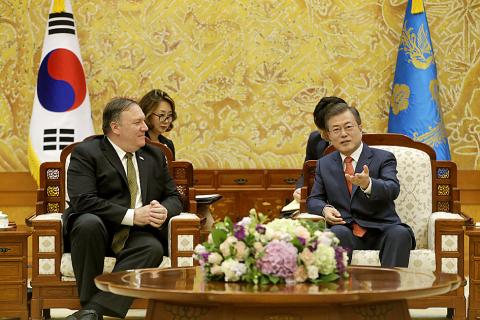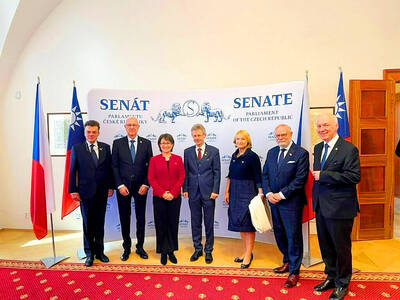North Korean leader Kim Jong-un has agreed to hold a second summit with US President Donald Trump as soon as possible, Seoul said yesterday, after Washington’s top diplomat held “productive” talks on denuclearization with him in Pyongyang.
US Secretary of State Mike Pompeo met with Kim yesterday morning for about two hours of talks followed by a lunch, before flying to Seoul on a whirlwind diplomatic visit to the region.
Pompeo said “he agreed with Chairman Kim to hold the second US-North Korea summit at the earliest date possible,” South Korea’s presidential office said in a statement, although no specific time or location has yet been agreed.

Photo: EPA-EFE
Pompeo and Kim also discussed “denuclearization steps that would be taken by North Korea and the issue of attendance by the US government,” as well as “corresponding measures” to be taken by the US, the statement said.
The visit was Pompeo’s fourth to North Korea.
“We continue to make progress on agreements made at Singapore Summit. Thanks for hosting me and my team,” Pompeo tweeted.
Kim also praised their “nice meeting,” telling Pompeo via an interpreter following the morning’s talks that it was “a very nice day that promises a good future ... for both countries.”
An official on the latest visit to Pyongyang with Pompeo said the trip was “better than the last time,” but added: “It’s going to be a long haul.”
Following his arrival in Seoul from Pyongyang, Pompeo said at a meeting with South Korean President Moon Jae-in that he had “a good productive conversation” with Kim, in talks which represented “another step forward.”
Moon, who held three summits with Kim this year and also brokered the Trump-Kim summit in Singapore, said the “whole world” was watching with keen interest the outcomes of Pompeo’s trip.
“I hope your trip to North Korea and the upcoming second US-North Korea summit will provide a good opportunity for achieving irreversible, decisive progress in terms of denuclearization and the peace process on the Korean Peninsula,” he said.
South Korean Minister of Foreign Affairs Kang Kyung-wha has given a hint of what a grand bargain between the two countries could look like.
In an interview with the Washington Post, she said the North could agree to dismantle Yongbyon, its signature nuclear site, and in exchange, the US would declare a formal end to the Korean War, but the North would stop short of delivering an exhaustive list of its nuclear facilities.
Pompeo is to wrap up his trip with a visit to Beijing today.

Two US House of Representatives committees yesterday condemned China’s attempt to orchestrate a crash involving Vice President Hsiao Bi-khim’s (蕭美琴) car when she visited the Czech Republic last year as vice president-elect. Czech local media in March last year reported that a Chinese diplomat had run a red light while following Hsiao’s car from the airport, and Czech intelligence last week told local media that Chinese diplomats and agents had also planned to stage a demonstrative car collision. Hsiao on Saturday shared a Reuters news report on the incident through her account on social media platform X and wrote: “I

SHIFT PRIORITIES: The US should first help Taiwan respond to actions China is already taking, instead of focusing too heavily on deterring a large-scale invasion, an expert said US Air Force leaders on Thursday voiced concerns about the Chinese People’s Liberation Army’s (PLA) missile capabilities and its development of a “kill web,” and said that the US Department of Defense’s budget request for next year prioritizes bolstering defenses in the Indo-Pacific region due to the increasing threat posed by China. US experts said that a full-scale Chinese invasion of Taiwan is risky and unlikely, with Beijing more likely to pursue coercive tactics such as political warfare or blockades to achieve its goals. Senior air force and US Space Force leaders, including US Secretary of the Air Force Troy Meink and

‘BUILDING PARTNERSHIPS’: The US military’s aim is to continue to make any potential Chinese invasion more difficult than it already is, US General Ronald Clark said The likelihood of China invading Taiwan without contest is “very, very small” because the Taiwan Strait is under constant surveillance by multiple countries, a US general has said. General Ronald Clark, commanding officer of US Army Pacific (USARPAC), the US Army’s largest service component command, made the remarks during a dialogue hosted on Friday by Washington-based think tank the Center for Strategic and International Studies. Asked by the event host what the Chinese military has learned from its US counterpart over the years, Clark said that the first lesson is that the skill and will of US service members are “unmatched.” The second

Czech officials have confirmed that Chinese agents surveilled Vice President Hsiao Bi-khim (蕭美琴) during her visit to Prague in March 2024 and planned a collision with her car as part of an “unprecedented” provocation by Beijing in Europe. Czech Military Intelligence learned that their Chinese counterparts attempted to create conditions to carry out a demonstrative incident involving Hsiao, which “did not go beyond the preparation stage,” agency director Petr Bartovsky told Czech Radio in a report yesterday. In addition, a Chinese diplomat ran a red light to maintain surveillance of the Taiwanese